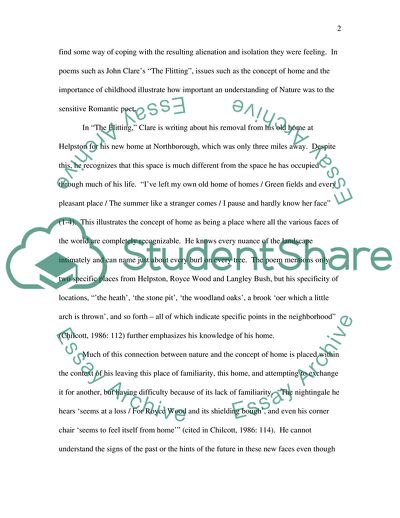
- Home
- Free Samples
- Premium Essays
- Editing Services
- Extra Tools
- Essay Writing Help
- About Us
- Studentshare
- Subjects
- Miscellaneous
- John Clare 'The Flitting' Poem commentary and analysis
John Clare 'The Flitting' Poem commentary and analysis - Essay Example

- Subject: Miscellaneous
- Type: Essay
- Level: Ph.D.
- Pages: 4 (1000 words)
- Downloads: 0
- Author: caltenwerth
Extract of sample "John Clare 'The Flitting' Poem commentary and analysis"
It also esteemed nature not only because of the creative element inherent in it, but also because of the manifestation of the imagination that could be found within it. In other words, a recognition that we create what we see. During the Romantic period, authors understood the world was full of symbols and signs that would portend future events and actions which were themselves knowable through their relationship to the myths and legends of antiquity. As a result, close knowledge of various individual elements of nature could have significant repercussions upon an individual’s ability to ‘know himself’.
Many of the concepts that emerged as a part of Romanticism were reactions to the social upheaval that was taking place at this time coupled with a shifting economic structure as individuals struggled to find some way of coping with the resulting alienation and isolation they were feeling. In poems such as John Clare’s “The Flitting”, issues such as the concept of home and the importance of childhood illustrate how important an understanding of Nature was to the sensitive Romantic poet.
In “The Flitting,” Clare is writing about his removal from his old home at Helpston for his new home at Northborough, which was only three miles away. Despite this, he recognizes that this space is much different from the space he has occupied through much of his life. “I’ve left my own old home of homes / Green fields and every pleasant place / The summer like a stranger comes / I pause and hardly know her face” (1-4). This illustrates the concept of home as being a place where all the various faces of the world are completely recognizable.
He knows every nuance of the landscape intimately and can name just about every burl on every tree. The poem mentions only two specific places from Helpston, Royce Wood and Langley Bush, but his specificity of locations, “’the heath’, ‘the stone pit’, ‘the woodland oaks’, a brook ‘oer which a little
...Download file to see next pages Read More
- TERMS & CONDITIONS
- PRIVACY POLICY
- COOKIES POLICY